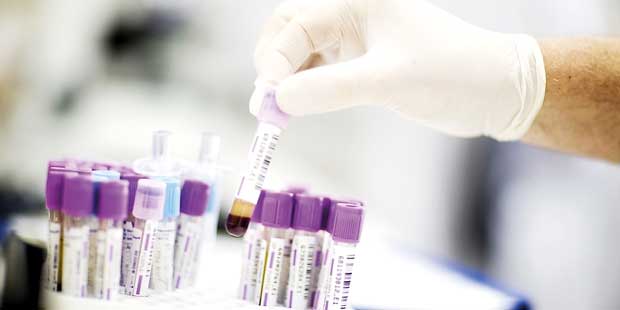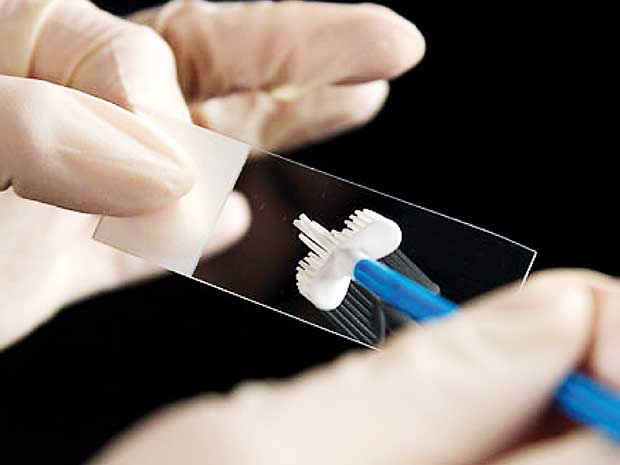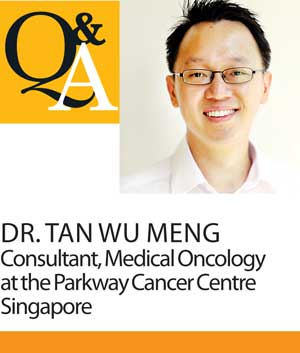Reply To:
Name - Reply Comment

 Cancer is everyone’s greatest fear in this day and age, due to its unpredictable nature. It’s a topic that’s taboo in a country like Sri Lanka and people aren’t willing to speak openly about it. However Dr. Tan Wu Meng, Consultant, Medical Oncology at the Parkway Cancer Centre in Singapore states otherwise and encourages the public to spread awareness on the subject.
Cancer is everyone’s greatest fear in this day and age, due to its unpredictable nature. It’s a topic that’s taboo in a country like Sri Lanka and people aren’t willing to speak openly about it. However Dr. Tan Wu Meng, Consultant, Medical Oncology at the Parkway Cancer Centre in Singapore states otherwise and encourages the public to spread awareness on the subject.
He states that this will make cancer a comfortable, conversational topic in order to make people more willing to get themselves checked and learn more about the disease.
Dr. Tan says that lung cancer is a common killer in the world. “Many people die from lung cancer every year. When considering the overall population, the biggest risk of lung cancer is through smoking. In this respect, even if you consider air pollution, it’s not as concentrated as smoke from a cigarette. However, we also sometimes meet patients who haven’t smoked their first cigarette, but have contracted lung cancer. It could have been second hand smoke or relate to family history. These are patients we want to help too. So if you are smoking, we encourage you to stop and help not only yourself, but your loved ones as well. If you’re not smoking, don’t even start.”

He further said, “In Asia, lung cancer is still very common because unfortunately smoking is still very prevalent even in countries where the young people don’t smoke as much. Older generations who have grown up smoking already have a lifetime of tobacco smoke in their lungs, so it is still an issue. Other cancers that we worry about in Asia would be cervix cancer and breast cancer among women because if you detect it early, it enhances the chance of curing. This is why we want to build awareness and encourage women to undergo checks and not to be afraid to talk about it. If you are afraid to talk about it, then you become afraid to see a doctor and get treatment early. Colon cancer too is very curable with early detection. But again, in many countries, whether it’s Asia or even in some of the Western Countries, people still don’t talk about it. So what we really want to promote all over Asia is for people to make cancer a topic for conversation. If people are unafraid to take treatment, go for screening-because there was an old perception that we picked up cancer at the place screening took place- and take treatment early, it will help patients recover faster.” Highlighting that early detection of cancer can give you a better chance of cure, Dr. Tan said,“In the early stages of cancer, the treatment is simpler and often shorter. Some cancers like stage 4 lymphoma may still be curable. There are treatments for some other cancers in stage 4 like lung cancer, even if they aren’t curable. These treatments can prolong life of the patient in a way which maintains the quality of life. Even if patients can’t be cured, newer treatments are helping patients live longer, better and more comfortably.”

Speaking about the different screening tests for cancers, he said, “For colon cancer, some patients will go for what they call a stool test, where they look for traces of blood in the stool. Another option is a colonoscopy, where a little camera is sent into the colon and pictures are taken. That is a better quality test than the stool test. For breast cancer, the standard screening test is a mammogram. For cervix cancer, it’s a pap smear. Unfortunately for lung cancer, we don’t have a good screening test yet, but there’s still a lot of research being done.”
 “We find that regarding lung cancer, a majority of patients are detected during stage 3 or stage 4. Some patients may have gone for a health check up and they incidentally found a lump in the lung when they went for a chest X Ray. Those would be the patents in the early stage of cancer. But by the time the lung cancer is causing symptoms, usually it is quite big and it has started to spread. There is a lot of research being done on lung cancer screening. There is an American study, a national lung screening trial in America, where they monitor very heavy smokers who have smoked for many years. They’ve sent these smokers for CT scans. They found that in some smokers you can pick up the cancer early, but when they looked at the statistics, the Americans found that you have to scan 320 heavy smokers to pick up 1 lung cancer patient earlier than usual. So still we don’t have a standard screening test. Because a lot of testing is needed a lot of radiation is involved and not many people benefit. So that’s one of the areas where experts are looking to
“We find that regarding lung cancer, a majority of patients are detected during stage 3 or stage 4. Some patients may have gone for a health check up and they incidentally found a lump in the lung when they went for a chest X Ray. Those would be the patents in the early stage of cancer. But by the time the lung cancer is causing symptoms, usually it is quite big and it has started to spread. There is a lot of research being done on lung cancer screening. There is an American study, a national lung screening trial in America, where they monitor very heavy smokers who have smoked for many years. They’ve sent these smokers for CT scans. They found that in some smokers you can pick up the cancer early, but when they looked at the statistics, the Americans found that you have to scan 320 heavy smokers to pick up 1 lung cancer patient earlier than usual. So still we don’t have a standard screening test. Because a lot of testing is needed a lot of radiation is involved and not many people benefit. So that’s one of the areas where experts are looking to
improve,” he added. “But every cancer is different. Each organ of the body can carry its own cancer. It can be a source of cancer, but each cancer can be treated differently, depending on where it started, what stage is it in and how fit the patient is,”
Dr. Tan added.
He further stated that the stigma against cancer patients is a worldwide problem, not just in Asia. “Some of that stigma may be based on myths that cancer is contagious, which is not. It cannot be spread from patient to patient, but sometimes there is this myth and people get scared. There is also this stigma where people assume that cancer can’t be cured. So when someone gets cancer, it may harm prospects. Again, that stigma can change around the world. There is a lot of room to improve that, both in the Western nations and the Asian nations.”
“Keep learning more about cancer. Public awareness is important. Keep on asking more and talking more. Because by doing this we can protect ourselves and our loved ones,” concluded Dr. Tan.